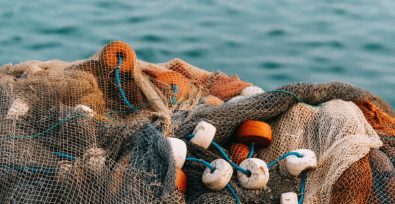Imagine being trapped on a boat with no toilets or showers, facing sea conditions that the vessel is not fit for. This is the reality of James*, a migrant fisherman working in the U.K.
What bothers him most is the cold; there is no heater and temperatures drop below 0°C (32° F). But James needs to earn money to feed his family back home, and he can’t risk leaving the boat and getting deported, so he endures these inhumane conditions.
Although unacceptable, James’ situation is not unusual for migrant workers in the U.K.’s fishing industry, especially in light of post-Brexit migration rules and the government’s ‘hostile environment’ migration policies. In an article for Byline Times, Frankie Vetch explores the factors that permit and exacerbate the exploitation of migrants at sea.
“Addicted to exploiting migrant labour”
Ghanaian fishermen told Byline Times that verbal abuse and racism are common on U.K. fishing vessels. Employers allegedly threaten workers with deportation or the confiscation of their passports. Some even said they had been physically assaulted.
Underpayment is also standard practice. They had contracts for as little as £700 (around $870) per month, despite working for well over 40 hours weekly. In reality, however, some were paid even less. This salary is considerably lower than the minimum wage, which is £1,520 (around $1,880) per month for someone over the age of 23 working 40 hours per week.
Despite being contracted to work on one specific vessel, interviewees also reported being repeatedly transferred from one boat to another, sometimes even in the middle of the night. “You feel like you have been trapped on a boat where you don’t have any means to even say you want to leave,” one worker explained told Byline Times.
“The fishing industry is addicted to exploiting migrant labour and underpaying them,” Chris Williams from the International Transport Workers’ Federation (ITF) told Byline Times.
The transit visa loophole
At the core of the problem is the type of visa which these workers hold. Over the last 15 years, the transit visa has been used to systematically exploit migrant workers, according to a report from the ITF.
The transit visa is designed for seafarers who are passing through the U.K. to board vessels that are destined for international waters; it is not intended for workers of U.K. fishing vessels. As a result, vessels with transit visa workers must stay outside the U.K.’s territorial waters, at least 12 nautical miles from shore.
Not only are sea conditions more dangerous in this area, but the environment is also less regulated, meaning workers are often isolated with unscrupulous employers.
How to protect migrant workers at sea
To eradicate the systematic exploitation of workers like James, the transit visa loophole must be closed, and skilled worker visas should be made more accessible to migrants in the fishing industry, according to ITF.
If more foreign fishing workers could access skilled worker visas, they wouldn’t be forced to stay at sea—they could rent suitable accommodation on land. And without the threat of deportation looming, they would be more empowered to report abuse.
Moreover, these visas have a minimum salary of more than double the amount the Ghanaian interviewees were earning, which could potentially address the issue of unfair wages.
Technically, workers for the fishing industry are eligible for the skilled workers visa, but Byline Times revealed that until now not a single foreign fisher has been granted a skilled worker visa.
Byline Times reports on the main reason this visa is inaccesible in practice:
The biggest barrier facing fishermen seeking to obtain a skilled worker visa is the English language test. Harry Wick, CEO of the Northern Ireland Fish Producers’ Organisation, believes the test is unnecessarily hard as it requires fishermen to write to a level that does not match the requirements of the job. Many foreign fishermen can speak good enough English and have enough specialist language knowledge to safely work on vessels. But to pass the test can take years of learning English. This is time and money many fishermen do not have.
Call for governmental action
Exploitation at sea around the U.K. is also exacerbated by the government’s wider ‘hostile environment’ policies, which aim to make life for migrants in the U.K. more difficult. Employers take advantage of these policies to wield the threat of deportation and avoid accountability for their abusive treatment.
The ITF report argues that by criminalizing migrant workers in the fishing industry for violating immigration regulations, the government is putting them at greater risk of exploitation. As Williams asserts, “UK legislation is enabling conditions for forced labour and modern slavery.”
The Freedom United community is raising awareness of the fact that restrictive immigration legislation drives a worker/employer imbalance, putting migrants at high risk of exploitation and abuse as a direct result.
We’re calling on governments, including the U.K. to reject immigration policies that cause trafficking and pass immigration legislation that meets international human rights standards and empowers migrants and trafficking victims by providing safe migration routes. Join us today! Sign the petition.
*This name has been changed.








Freedom United is interested in hearing from our community and welcomes relevant, informed comments, advice, and insights that advance the conversation around our campaigns and advocacy. We value inclusivity and respect within our community. To be approved, your comments should be civil.